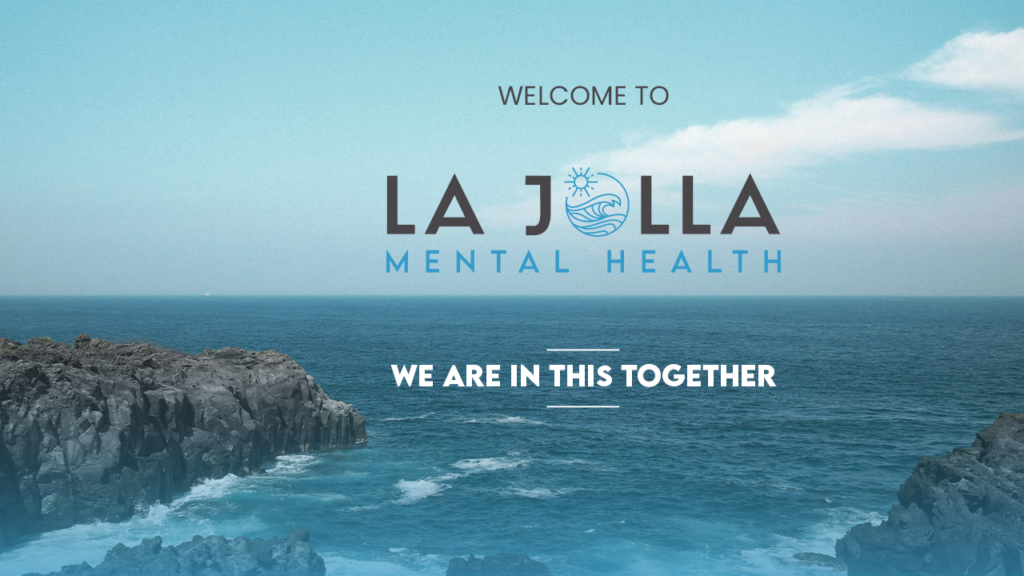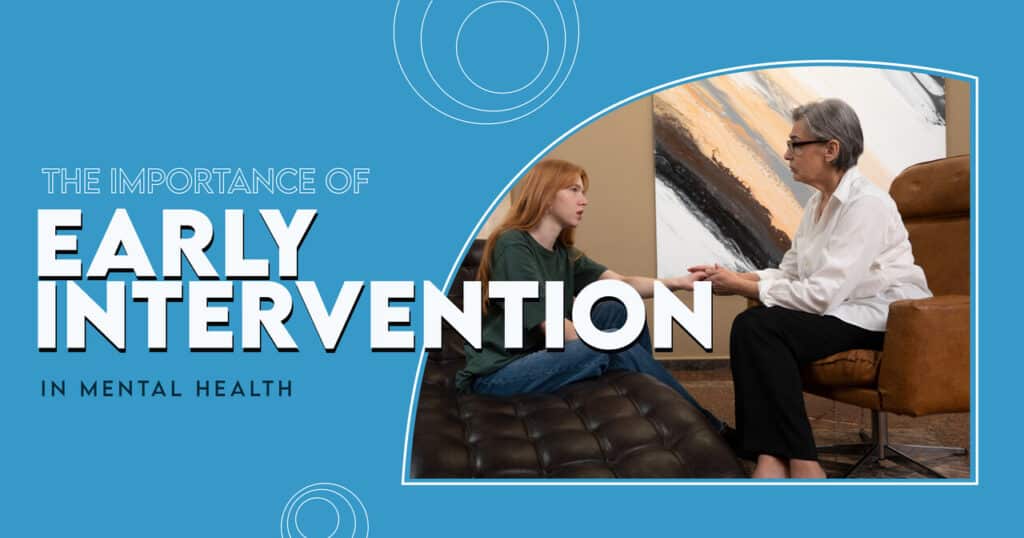It is not a secret that resolving any problem is easier when you catch it early. This principle rings especially true when it comes to the physical and mental well-being of any person. Figuring out what is wrong early means having a better chance of healing. In the article below we will elaborate on the meaning of mental health prevention, explain why early intervention matters and how it reduces the impact of any mental health condition, and showcase why therapy may be the best support to enlist when you suspect any mental health issues in yourself or others.
What Is Early Intervention in Mental Health?
Mental health is tricky – whether you or another person experience symptoms of untreated mental health disorder, in many scenarios the need for assistance is not evident until it is late. You may brush off the concerns of other people not admitting to yourself you have a problem – just like a person close to you might exhibit weird behavior and refuse to have a conversation about it citing any excuse they can think of.
Early intervention means taking meaningful action and eliminating the possibility of a more serious condition in the long run. As soon as you are able to identify the dangerous signs of a possible illness, do not hesitate to find a way to manage the issue – whether you want to deal with it privately, open up to your friends, or get therapy.
Signs and Symptoms of Emerging Mental Health Issues
Here are some early signs of mental illness you should be on the lookout for whether you are concerned about yourself or someone else:
| Symptom | Description |
Drastic Changes in Behavior |
If you notice someone is not sleeping well, they are eating less or more than what they are used to, they are making radical changes to their life, and their choices do not make sense based on what you know about them, this might suggest they are suffering from something internally |
Mood Swings |
Feeling on top of the world one minute and feeling crushed shortly after for no apparent reason – in case your mood shifts from joy to sadness in the blink of an eye, pay attention to your psyche |
Lack of Emotional Response |
Indifference, apathy, and lack of enthusiasm for events and activities that used to bring you happiness in the past often means that you have to resolve an internal conflict that is growing in your mind |
Confusion |
Inability to focus, concentrate on the most basic things, failure to make decisions you never struggled with before – all these signs may indicate there is a deeper underlying issue you should deal with |
Benefits of Early Intervention for Long-Term Mental Health
Whether you suspect your own mental well-being is in danger or you started noticing worrying signs in someone you know well, consider the following benefits of early intervention in mental health:
- There is a higher chance of complete recovery if the symptoms are detected early – mental health is no different from physical in this aspect. Instead of ignoring the problem, you can address it early – besides, a more serious treatment most likely implies higher expenses which is not accessible to every potential patient.
- Whether the person struggling with mental health is young or old, their social development matters. Be proactive with early intervention and you will see the results – for instance, if a teenager is unable to cope with their issues on their own, your intervention will show them you support them unconditionally and create a better, more fulfilling future for your entire family.
- If you are able to prevent one mental disorder from developing, it will reduce the likelihood of another problem appearing. For example, a person struggling with anxiety can make a positive change to their life by following a strict sleep routine – in turn, this will eliminate sleep disturbances they would otherwise face later on.
Types of Early Intervention in Mental Health
Individual Therapy
Book a couple of therapy sessions with a mental health provider to see if they make suggestions to make your life easier. While feeling worried about your well-being and going to therapy does not automatically imply you have something to be scared of, at the very least a therapist will help you find your voice and share what bothers you.
Group Support
It may be a good idea – furthermore, a more affordable treatment option – to try therapy with other people. Listen to their stories and elaborate on what makes your heart feel heavy – together you will be able to see yourself from the perspective of someone else’s experience and course-correct whatever you need in your life.
Medication Management
Your path to recovery can be facilitated by prescription medication. If you feel you have lost your way and there are symptoms you cannot eliminate with various relaxation techniques or lifestyle modifications, inform your therapist about it – in case it is required, they can prescribe you antidepressants that help with anxiety, restlessness, and insomnia.
Challenges and Barriers to Early Intervention
The human factor remains the main cause of early intervention being rather rare – a person may be reluctant to admit there is anything wrong with them, the community that surrounds an individual may fail to recognize the early signs of mental illness, and some mental health providers do not do their job properly refusing to help patients in the early stages of mental disorders. Moreover, there is a persisting stereotype that mental health can only be taken seriously when it is visible and obvious to other people and causes great harm to the person’s professional life (personal life struggles are often swept under the rug). Nevertheless, if you believe intervention is required, do not quit – continue to care about your own mental health and about other people around you, look for a different therapist if the initial visit was fruitless, and seek mental health treatment options available to you today.
Steps to Seek Early Mental Health Support
Here is how you can ask for help upon suspecting a mental health problem:
| Strategy | Description |
| Reach Out to Your Inner Circle | Tell the people you trust you have been struggling and ask for their advice and help. It is likely their willingness to take care of the responsibilities will be essential on your path to recovery |
| Consider Therapy | Take your time when shopping for a therapist – you should not rush. Do your research, figure out if the person in front of you can help you, and be ready to switch or change treatment options if something does not work out |
| Manage Your Workload | You do not have to share the details of your mental health journey with third parties – still, find an opportunity to study or work less in case you feel overwhelmed by your duties |
Building a Future of Proactive Mental Health
Making your mental health a priority will benefit you both short and long-term – in today’s world, it is easy to dismiss the concerns of another individual and even your own worries in relation to mental well-being, although a healthy mind is vital for all endeavors, both personal and professional. When you spot a difference in your lifelong habits and behavior as well as its negative impact on your private affairs and work, do not postpone the process of finding a solution to the issue.
No matter how complicated or trivial your challenges feel to you, therapy may be the best way to address them – if none of the steps and actions you have come up with help you, it may be time to connect with a therapist, either offline or online, and discuss the possibility of professional early intervention.
FAQs
- How to recognize when early intervention is needed?
Look for anything out of the ordinary – it is possible a person is struggling with a mental disorder but is afraid to acknowledge the need for help. Even the smallest changes in behavior such as poor appetite or frequent mood swings can mean there is a reason to be cautious.
- What are the advantages of early intervention?
Prevention of any mental health issue is the perfect option, and the second best option is nipping the problem in the bud. Even if your fears are unfounded, taking care of yourself and your loved ones is a wonderful decision – you can spend quality time together, raise awareness about mental health, and encourage other people to pay attention to their mental state.
- What can prevent early intervention in mental health?
It may be difficult to identify the mental health issue when it has been only a few weeks of odd behavior – furthermore, many people will be convinced that any harmful sign will just go away on its own. Do not give up in your attempts to get help and find a suitable therapist to assist you if needed.
- Is it possible to help others with early intervention?
Many people have been saved because their family, friends, and colleagues have noted their weird behavior and encouraged them to seek help. While the struggling individual may be in denial, ensure you do your best to express your support and suggest specific ways to make their life easier.
- Can I go to therapy as a part of early intervention?
Listen to your gut and be honest with yourself about your ability to handle emotional distress – there is no shame in making your mental well-being a priority and getting professional advice that will improve your life.








